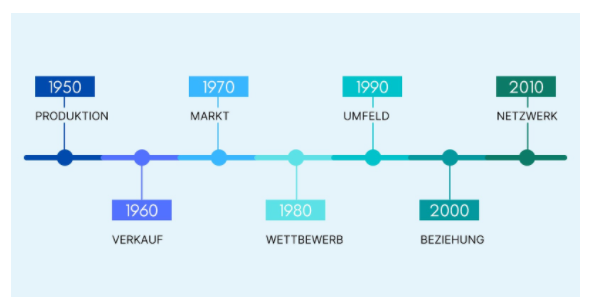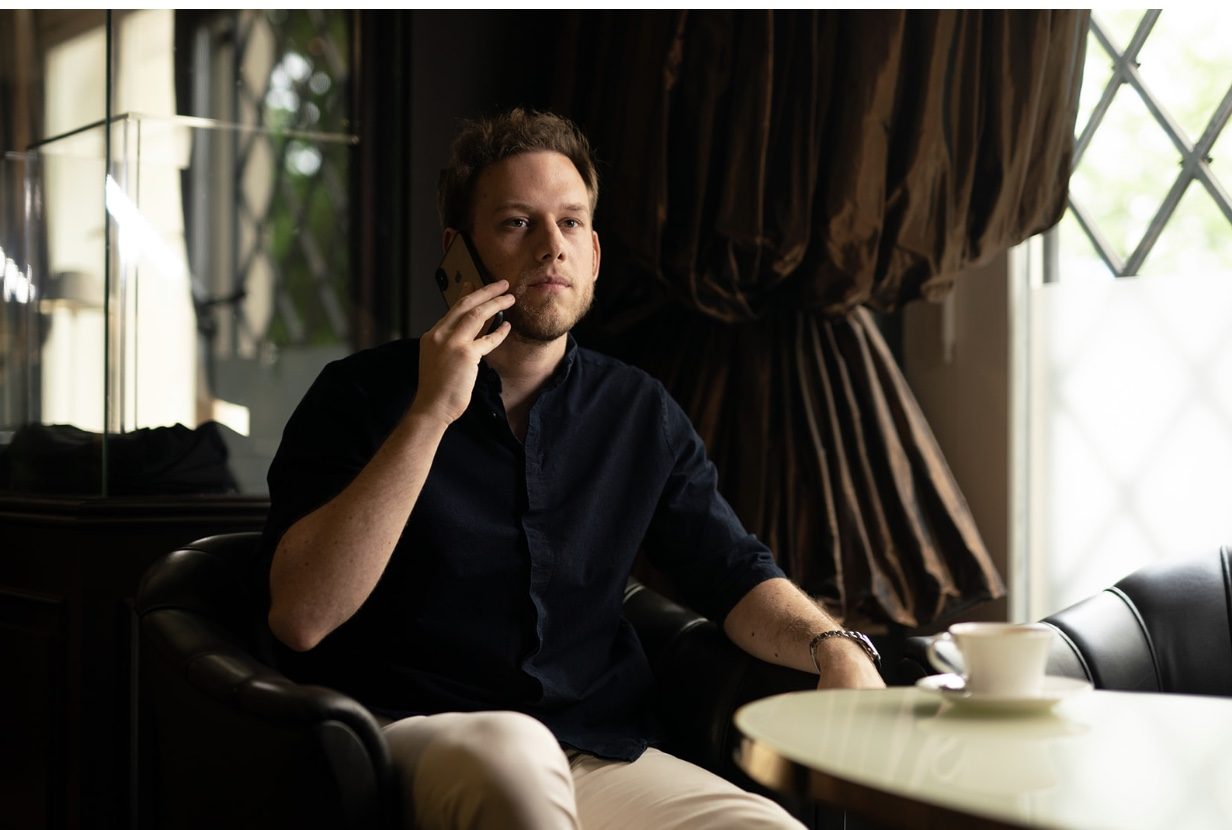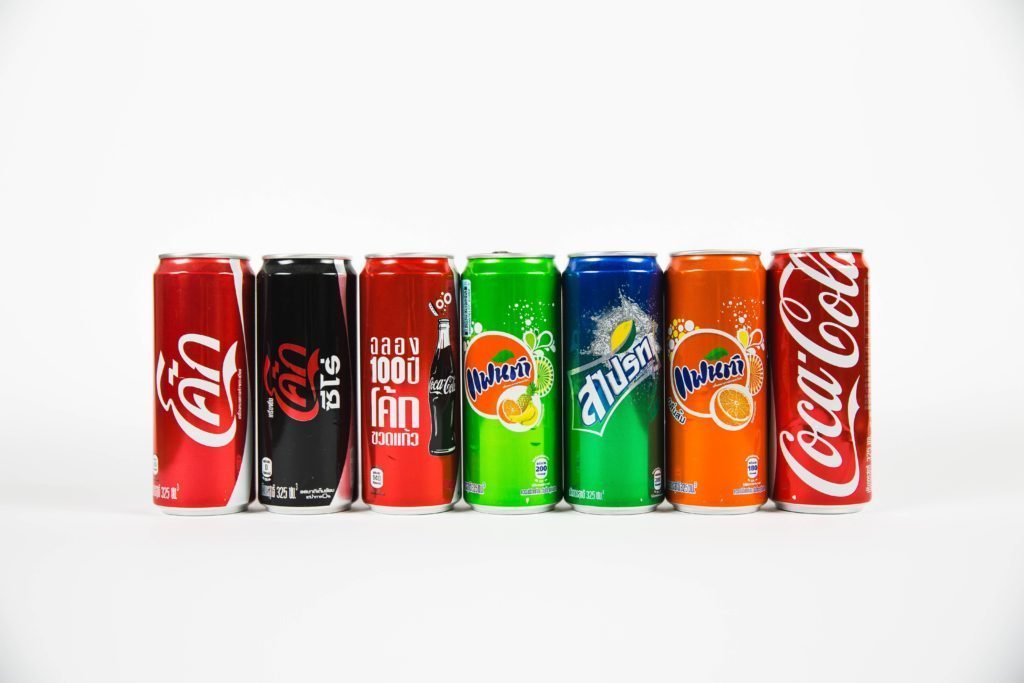Our understanding of marketing has been shaken. After years of the advertising world assuming that differentiation leads to sales success, marketing professor Sharp has proven: No one cares. Only 17% of all consumers think the brand they buy is unique. Researchers have found out that strategic differentiation is by far not as important as thought. What matters instead?
Can we do without unique selling propositions, competitive advantages & Co. in the future?
Development phases of marketing
Marketing specialists have to review their methods and theories at regular intervals. New findings from research and constantly changing customer needs make marketing as a field an exciting challenge. Let's take a brief look at the phases of development and their underlying schools of thought.
The 1950s were marked by production orientation. After the Second World War, the main focus was on satisfying the huge demand and driving mass production. In the 1960s, the focus shifted from production to distribution. The change from a seller's to a buyer's market took place. Due to oversupply, consumers and their needs came to the fore in the 1970s. Market segmentation was invented.
In 1980, strategic competitive advantages were finally discovered and their importance in a market with increasingly equal marketing activities. It was no longer enough to respond to the needs of the customer alone. Companies had to differentiate themselves from the competition by means of USP (Unique Selling Proposition), KKV (Comparative Competitive Advantage) or SEP (Strategic Success Position). Brand differentiation was born.

Chart 1: Development phases of marketing
Long live differentiation, differentiation is dead!
For years, marketing propagated the building of strategic competitive advantages. Everyone talked about unique selling propositions. Marketing departments racked their brains over differentiation and positioning. Product managers discussed with advertising experts what makes toothpaste #54 so unique.
All for nothing! At least that is what the findings of the Australian Ehrenberg-Bass Institute suggest. Researchers have found that strategic differentiation is nowhere near as important as thought. Consumers hardly remember the communicated values of the product or company. Even more frightening is that users do not even perceive their "favorite brand" as particularly original.
Byron Sharp referred to these findings in his book "How Brands Grow". Only 17% of consumers surveyed perceive their preferred brand as unique. As a result, Sharp concludes "Branding lasts, differentiation doesn't". What does this mean for the purchase decision process?

Branding: How Logo & Co. influence purchase decisions
Sharp proves: Customers make their purchase decisions based on the look-and-feel of the brand instead of remembering the values communicated by the company. When you buy a toothpaste, it's mainly because the logo and product packaging are distinctive to you. You can easily distinguish brand X from brand Y. But you don't think (consciously) about the brand. But you don't (consciously) think about the special features of brand X compared to brand Y (e.g. makes teeth whiter or tastes better).
In his book "How Brands Grow", Sharp uses seven rules to show how sales success and market share can be increased. One of these rules is "Create and use distinctive brand assets". What are brand assets? Brand assets are elements such as logos, slogans, fonts or colors that help consumers identify the brand.
A positive purchase decision is made when the customer quickly notices and recognizes the brand identity. Coca-Cola's red, Disney's Mickey Mouse ears, Adidas' three stripes or Nike's catchy slogan "Just Do It" are examples of the distinctiveness of successful brands.
Differentiation vs. distinctiveness: who is right?
Since the publication of "How Brands Grow" more than 10 years ago, two camps have formed in the field of marketing that debate with and sometimes against each other. This can be observed above all in the English-speaking world. Daniel Differentiation argues with Diana Distinctiveness. Daniel is into values and "why's". He reads books by Simon Sinek ("Find your Why") and Al Ries ("Positioning"). His world is strategic. He wants to differentiate his brand.
Diana, on the other hand, believes in the look-and-feel of her brand and prefers to invest in logos rather than values. She reads books by Byron Sharp ("How Brands Grow") and David Airey ("Identity Designed"). Her world is tactical. She wants her brand to be distinctive.
Who is right? Both. Daniel starts by asking himself on a strategic level what makes his brand so different, while Diana makes sure that the logo and slogan have a high recognition value. Before the Ehrenberg-Bass Institute shared its research insights, Daniel had an office in a prime location and Diana had to settle for a sideline. Today, the two sit together as equals. Strategic differentiation has lost its high status, but not its raison d'être.
Unique selling propositions as the basis of distinctiveness
The question should not be "differentiation or distinctiveness?" because both concepts should be integrated into the construction of a brand. The client may not see it - but it is the underlying values and ideals of a company that enable the development of a distinctive brand identity. Designers and copywriters need a starting point for their graphics and slogans.
If you don't know what the brand stands for internally and how it differentiates itself, you can't express it externally. What it doesn't need, on the other hand, is too much focus on otherness. No USP found for your own brand? The same product range as the competitor? All not so bad, show the findings of the Ehrenberg-Bass Institute.
Nevertheless, strategic considerations of differentiation should flow into the entire visual appearance of the brand. This is the only way to make it tangible and authentic.
Brands need less differentiation and more humanity
The American economist Philip Kotler has created standard works with his books. One of his latest books deals with the further development of marketing. Even though the experts talk about consumers, consumers and customers, in the end it is people who buy something.
They fall for cheap advertising tricks and have a good sense for the authenticity of company appearances and product claims. Kotler postulates: "Brands have to be human". He shows how exactly this works by means of 6 attributes that make up successful brands.
People strive for perfection, even if they never come close to it. We trust other people who celebrate their successes but also share the downsides with us. That's exactly how brands should be - accessible and likeable, but also vulnerable. This is the only way to build attachment. Table 2: The six attributes of human brands according to Kotler
Conclusion
Brands are successful when they are authentic. Brands do not have to be radically different from each other, as theories of USP and unique positioning claim. Differentiation still has its place, even if its value has declined. Companies should focus on building distinctive brand assets. It is more important to create distinctive logos and slogans than to define and communicate unique selling propositions.
Companies should nevertheless engage in strategic thinking about identity, differentiation and values. This is the only way they can give their brands a face. This is important because personalities differ from each other.
Brand building in the online and offline world needs strategic as well as tactical considerations. Differentness and distinctiveness are not mutually exclusive. Both have their justification. Companies should keep this openness and create brands that are different and distinctive - just like us!
Sources:
Bruhn, M. (2019). Marketing. Wiesbaden: Springer Gabler.
Kotler, P. (2017). Marketing 4.0. Frankfurt/New York: Campus Verlag.
Sharp, B. (2010). How brands grow. Oxford: Oxford University Press
Ehrenberg-Bass Institute (2020, February). Differentiation vs. distinctiveness. https://www.marketingscience.info/differentiation-vs-distinctiveness-i-e-stand-out-or-be-distinctive/


